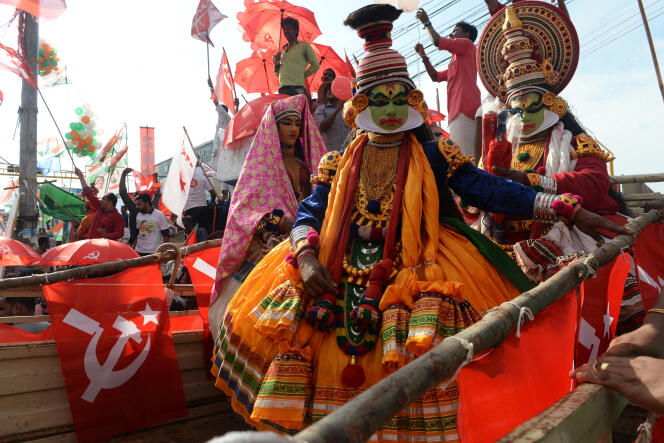
Where else can you see communists marching together with images of Karl Marx, Friedrich Engels and Krishna, the eighth incarnation of the god Vishnu, in party parades advocating dialectical materialism? Only in Kerala, a state in Southwestern India, where 100% of its children go to elementary school, including girls. Kerala is also the most socially advanced state in the Indian Federation, with the highest life expectancy (73 years in the city), universal medicare cover and free education for all. To the great pride of its inhabitants and the Communist Party in power, the state is still beating records that most other states of India envy – not to mention other countries of the planet.
This performance on the social front has been so striking that in the decades following the formation of Kerala as a state of the Indian Union – it was created on a linguistic basis in 1956 following the merger of the monarchies of Travancore, Kochi and Malabar district – many experts, including those at the United Nations, haven't shied away from describing it as the "Kerala model."
A new social model, but also, perhaps, the survival of a past which, elsewhere in the world, with the exception of the post-communist authoritarian regimes of China and Vietnam, is now over. In 1957, the Keralites, who never miss an opportunity to be outstanding, had already voted for the Communist Party of India, which won a victory in the state that marked the first success of a CP coming to power through the ballot box and not by force. Thereafter, the Communists have continued to achieve electoral successes here within the framework of somewhat heterogeneous political coalitions, alternating its passages in power with the Congress Party of the Nehru-Gandhi family during the various legislative elections.
In 2021, the Communist Party of India (CPI, Marxist) – the largest of the two branches of the Indian CP – won the local legislative elections for the second time in a row, a feat not seen in the state for 40 years. Proof that, as the movement's supporters believe, the Indian avatar of a Marxist-Leninist formation is doing rather well in these tropical latitudes.
'Last pocket of resistance'
"Kerala is a bit like our Asterix village," joked Venu Rajamony, diplomat and former Indian ambassador to the Netherlands, whom Le Monde met in his residence located under the coconut trees near one of the inlets irrigating the hinterland of Kochi, whose old city is teeming with architectural traces of the successive presence of Portuguese, Dutch and British settlers.
You have 68.04% of this article left to read. The rest is for subscribers only.